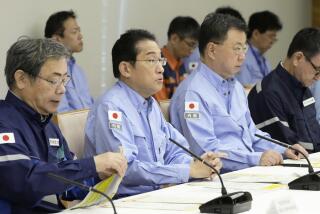Deployment Allows Japan to Show the Flag Overseas
- Share via
SAPPORO, Japan — Like the contingent of Japanese soldiers under his command, Col. Yuki Imaura went to Iraq this year carrying a gun -- and with unspoken but clearly understood orders to stay out of situations in which he’d have to use it.
Imaura’s troops were deployed in Iraq to be symbols as much as soldiers, the leading edge of Japan’s effort to move beyond a post-World War II constitution that restricts military operations to self-defense.
It is widely acknowledged that the modest Japanese contingent is not in Iraq to impose order. Barely noticeable in a sea of 140,000 U.S. troops, the 550 members of the Self-Defense Forces, including 130 infantry, have no legal mandate to suppress the insurgency. They even rely on Dutch troops for their own security.
Instead, the Japanese have delivered incubators and purified water and laid sod in the soccer stadium of a provincial city -- any small gesture, as long as it avoids the violence that could bring the delicate mission down.
“We know if we have even a single casualty over there, it will be a big, big political problem in Japan,” said Imaura, who recently returned from Iraq.
So far, so good. More than seven months into their deployment in the relatively peaceful Shiite Muslim city of Samawah, Japan’s troops have achieved what many here say is their main goal: showing the Japanese flag on a military expedition abroad, without getting hurt or hurting any Iraqis.
With little public debate, Prime Minister Junichiro Koizumi has already signaled that he will renew the troop commitment for another year when its mandate expires in December.
That is welcome news for the Bush administration, which is dealing with queasy allies who are looking for ways to get out. Reports here suggest Koizumi, whose friendship with the U.S. president led him to openly wish for a Bush victory in November, may even increase the size of the Japanese contingent to compensate for a planned Dutch withdrawal in March.
But the prime minister is also acutely sensitive to the swath of citizens still wary of foreign military adventures, and the Iraq war in particular. Although the Japanese may grudgingly support troops being sent on a “humanitarian” mission, it is widely believed that they have no wish to see their soldiers exchange gunfire in the role of an occupying force.
The result is that the more perilous Iraq becomes, the more cautious the troops get.
“We did a lot of projects during calm times in June, July, and the local people had accepted us,” Imaura, a friendly, 45-year-old career officer, said during an interview at a base in Sapporo. “I think the Iraqis liked us because they expected a big industrial power like Japan to rebuild their city. They told us: ‘We have the same experience as you of being defeated by the Americans.’ ”
But as attacks against foreign forces increased in August -- including an ambush that killed two Dutch soldiers near Samawah and mortar attacks on the Japanese base -- Imaura’s troops retreated farther inside their heavily fortified camp.
“We couldn’t go out of the camp for half of August,” Imaura said, showing photographs of the sandbagged shipping containers in which his troops hunkered down. He said the contingent that replaced his in September has ventured out even less, which may help explain why the locals have soured on the Japanese presence.
“It’s dangerous to patrol, but it’s also dangerous not to,” Imaura said. “The local people start to think that the Japanese are not working hard for them.
“We have the ability to protect ourselves,” he added. “We should be patrolling more aggressively, at least in daytime.”
Allowing troops in Samawah to handle their own security would probably require amending the constitution, observers say, a historic and politically fraught undertaking the prime minister does not seem eager to consider.
Yet sending soldiers into a foreign hot zone has been a major step in transforming Japan’s culture of defeat in the postwar years. In particular, it addressed the stinging embarrassment of the Persian Gulf War in 1991, in which Japan was asked to help underwrite the war but was told its troops weren’t welcome.
“It is impossible to overstate the trauma felt here after the Gulf War,” said Glen Fukushima, a Tokyo-based telecommunications executive with links to the Japanese and U.S. political establishments. “We contributed so much money and got so little recognition for it, and the feeling here was, let’s never repeat that experience.”
With a wary eye on China’s strengthening military and North Korea’s nuclear program, Koizumi is in the process of rewriting Japan’s defense policy. A panel of defense experts appointed by the prime minister recently recommended a more muscular role for Japan in overseas security missions. The panel also stirred controversy by saying Japan should consider developing a capability to strike first at any imminent threat, such as a North Korean missile launch.
In that atmosphere, the Iraq mission appeals to Japanese who want to see their country play a greater role in world affairs. In government circles, the deployment was also seen as a small price for gaining the gratitude of the White House.
Provided, of course, that the mission avoids sliding into bloodshed.
“Oh yes, I expected casualties,” Imaura said. “Before we left, I told my soldiers: ‘Believe me, I am a lucky man. I will bring you back alive.’
“But I actually thought we would have victims. We were very, very lucky.”
More to Read
Sign up for Essential California
The most important California stories and recommendations in your inbox every morning.
You may occasionally receive promotional content from the Los Angeles Times.













